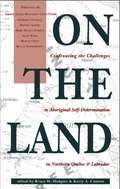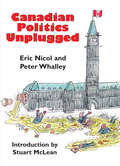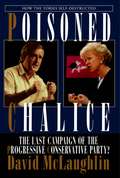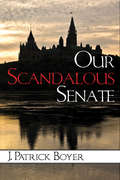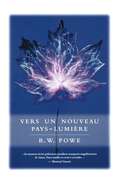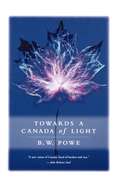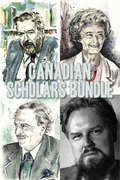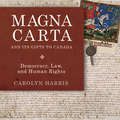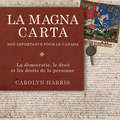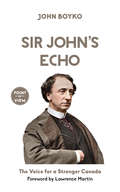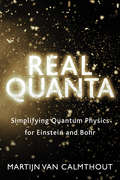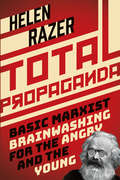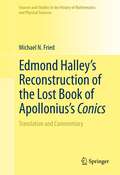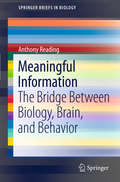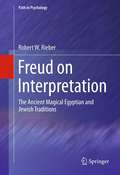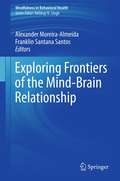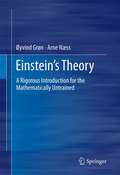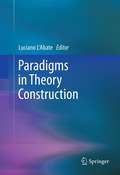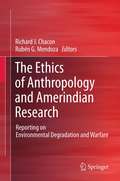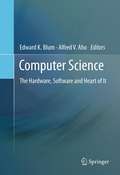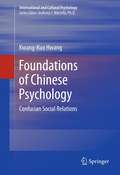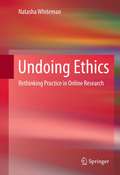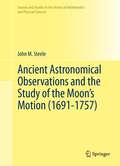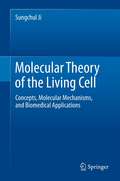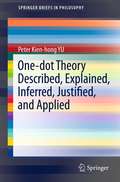- Table View
- List View
On the Land
by Bruce W. Hodgins Kerry A. CannonIt is from the land that the Native peoples of Canada draw their strength.If the people of Quebec claim a right to sovereignty, Inuit of Quebec argue their right of self-determination empowers them with the choice to remain part of Quebec, of Canada or to secede on their own. <p><p> The James Bay Cree consider Hydro Quebec’s "mad plans to engineer and dam the vast ecosystem" where they have lived for centuries an affront to their own right to control their land.The Labrador Innu are struggling with both the federal and provincial governments to protect their traditional hunting territories from threats imposed by military training flights and mineral exploration. <p> All of these are challenges. As the Native peoples of Canada are meeting them, asserting their right to make choices for themselves, they stand steadfastly "on the land" from which flow their inherent rights to self-determination.
Canadian Politics Unplugged
by Eric Nicol Peter WhalleyCanadian politics is/are not well understood, no authority being prepared to say whether it/they is/are singular or plural. Canadian Politics Unplugged bravely breaks new ground in ignoring this question. The book concentrates on the central problem of democracy in a country that is too big to digest without getting gas.Readers are assured that the authors have studied Canadian politics for years, from a safe distance, and enjoy the unique perspective of never having been elected to high office, low office, or any place where wearing shoes is mandatory.Canadian Politics Unplugged is Whalley and Nicol’s fifth successful collaboration.
Poisoned Chalice: How the Tories Self-Destructed
by David MclaughlinPoisoned Chalice chronicles the fateful end of the federal Progressive Conservative government in Ottawa. The Progressive Conservative Party sought to remake itself by choosing the first woman prime minister in Canadian history, but failed to heed the lessons of Meech or Charlottetown. Their strategy nearly worked. By the time the election was called, the Tories were neck and neck with Jean Chrétien’s Liberals. Then it all fell apart. This book, published exactly one year after the event, tells how and why it happened. It gives a day-by-day account of an election campaign seemingly doomed to failure. It covers the strategy, tactics and political machinations that drove the Conservative campaign from the point of view of someone "on the bus." Read the strategy memos given to Kim Campbell. Listen in on her election-night phone call to Jean Chrétien. Relive Kim Campbell’s campaigh from one end of the country to the other. More than just that, Poisoned Chalice asks fundamental questions about how one of the founding political parties of Canada could come to such an ignominious state. Does the Progressive Conservative Party have a future? Has it been overtaken for good by Reform? This book takes the reader back to the seeds of the Tories’ defeat, from the constitutional debate and referendum, to the Conservative leadership race that never was, to Kim Campbell’s shining summer, to the electoral devastation of just two seats.
Our Scandalous Senate
by J. Patrick BoyerAn in-depth breakdown of the recent wave of Canadian Senate scandals, highlighting the need for abolition. The Senate of Canada was created as a temporary expedient at the time of Confederation, offered as part of the negotiations to bring Canada’s original colonial provinces into the new political union in the mid-1860s. Since then, the original provinces with upper houses abolished them. New provinces were created without second chambers to their legislatures. Only the Parliament of Canada remains stuck with its redundant and irrelevant colonial relic, costly to maintain and out of step with the values of a modern democratic country. Today, the Senate of Canada is rocked by ongoing scandal. News of this far-reaching scandal rightly disturbs Canadians, but the real national scandal is the very existence of the Senate itself.
Vers un Pays-Lumiere
by Bruce W. PoweB.W. Powe’s visionary work of political philosophy dares to re-imagine Canada. First conceived in 1993, this fully revised, expanded, updated edition, complete with an inspired new introduction that considers Canada in a post-9/11 context, is a landmark book that has become a classic text for understanding the work-in-progress that is Canada. Countering George Grant’s pessimistic Lament for a Nation, which defined the intellectual climate in Canada for decades, Powe argues that our country is in fact a completely original model of what an enlightened polity might be for the 21st century. Here is a passionately inspired portrait of Canada as a communication state – a counter-nation of loose ties and subtle associations where dialogue, ideas, debate and the exchange of information is the currency that holds us lightly together. Towards a Canada of Light points to the urgent realization of a new and liberating way of what it means to be Canadian.
Towards a Canada of Light
by Bruce W. PoweB.W. Powe’s visionary work of political philosophy dares to re-imagine Canada. First conceived in 1993, this fully revised, expanded, updated edition, complete with an inspired new introduction that considers Canada in a post-9/11 context, is a landmark book that has become a classic text for understanding the work-in-progress that is Canada. Countering George Grant’s pessimistic Lament for a Nation, which defined the intellectual climate in Canada for decades, Powe argues that our country is in fact a completely original model of what an enlightened polity might be for the 21st century. Here is a passionately inspired portrait of Canada as a communication state – a counter-nation of loose ties and subtle associations where dialogue, ideas, debate and the exchange of information is the currency that holds us lightly together. Towards a Canada of Light points to the urgent realization of a new and liberating way of what it means to be Canadian.
Canadian Scholars Bundle: Lucille Teasdale / Robertson Davies / George Grant / Marshall McLuhan
by Nicholas Maes Judith Fitzgerald T. F. Rigelhof Deborah CowleyPresenting four titles in the Quest Biography series that profiles prominent people in Canada’s history. In these books we explore Canada’s rich academic and philosophical history through the fascinating lives of some of its most influential figures. Profiled are: prescient media guru Marshall McLuhan, physician Lucille Teasdale, political philosopher George Grant, and novelist and literary theorist Robertson Davies. Includes: George Grant, Lucille Teasdale, Marshall McLuhan, and Robertson Davies.
Magna Carta and Its Gifts to Canada: Democracy, Law, and Human Rights
by Carolyn HarrisA deep and gorgeous study of the Magna Carta and how it still influences our world. The year 2015 marks the 800th anniversary of the Magna Carta, the Great Charter imposed on King John by his barons in the thirteenth century to ensure he upheld traditional customs of the nobility. Though it began as a safeguard of the aristocracy, over the past 800 years, the Magna Carta has become a cornerstone of democratic ideals for all. After centuries of obscurity, the Magna Carta was rediscovered in the seventeenth century, and has informed numerous documents upholding human rights, including the American Declaration of Independence, the French Declaration of the Rights of Man, and the United Nations' Universal Declaration of Human Rights. For Canadians, it has informed key documents from the Royal Proclamation of 1763 that shaped the then-British Colonies and their relations with First Nations, to the Charter of Rights and Freedoms. This book complements the 2015 Magna Carta Canada exhibition of the Durham Cathedral Magna Carta and Charter of the Forest.
La Magna Carta, son importance pour le Canada: La démocratie, le droit et les droits de la personne
by Carolyn HarrisLa Magna Carta avait été conçue au départ dans le but d’assurer que le roi Jean respecte les us et coutumes de la noblesse au XIIIe siècle. Au cours des huit cents années qui se sont écoulées depuis sa création, elle est devenue la pierre angulaire des idéaux de la démocratie pour tous. La « Grande Charte » a inspiré de nombreux documents portant sur le respect des droits de la personne, y compris la Déclaration d’indépendance des États-Unis, la Déclaration des droits de l’homme et du citoyen de la France, et la Déclaration universelle des droits de l’homme des Nations Unies. Pour les Canadiens, la Magna Carta a servi de modèle pour d’importants documents, depuis la Proclamation royale de 1763, qui a façonné les colonies britanniques de l’époque et les relations de celles-ci avec les Premières Nations, jusqu’à la Charte des droits et libertés. La Magna Carta : son importance pour le Canada est une célébration des huit cents années d’existence du document ainsi que de son influence sur le Canada et le monde entier.
Sir John's Echo: The Voice for a Stronger Canada
by John BoykoThe Hill Times: Best Books of 2017 As Sir John A. Macdonald intended, the federal government must be recognized as the nation’s voice. Power. It is the capacity to inspire while encouraging and enabling change, and it matters. When handled in a positive way, power is the key to the state’s ability to strengthen the nation and improve lives. But state power, John Boyko argues forcefully, works best when concentrated on a federal level, as Sir John A. Macdonald and Canada’s other founders intended. Provincial governments are essential, tending to local matters, administering and helping to fund national programs, and sometimes acting as incubators for ideas that grow to become national programs. But in fighting for scraps of power, premiers have often distracted from and occasionally hindered national progress. It is the federal government, as Boyko explains, that has been the primary force in nation building and emergency response, and is the only entity with the authority to speak for all Canadians. Canada has been at its best, and its strength will continue to grow, if we are true to Macdonald’s vision, with the federal government speaking for us in one voice, a voice that will remain Sir John’s echo.
Real Quanta: Simplifying Quantum Physics for Einstein and Bohr
by Martijn Van CalmthoutAlbert Einstein and Niels Bohr walk into the famous Hotel Métropole and sit down at the author’s table to discuss the state of quantum mechanics today. Particles that exist in two places at once, consequences that occur without a cause, objects that exist only if you look at them — quantum mechanics proves that all of this is possible, and not just in dark science labs. Look no further than your smartphone or tablet for technology made conceivable by quantum theory. From quantum computers to “teleporting” data, medicine to photosynthesis and the quantum compass in some migratory birds, Martijn van Calmthout plainly explains — to his readers and to an astounded Einstein and Bohr — how Quantum 2.0 is increasingly part of everyone’s daily life. Rather than being the exceptional domain, Van Calmthout shows how quantum mechanics is actually part of our tangible world, and may even be the very crux of our existence.
Total Propaganda: Basic Marxist Brainwashing for the Angry and the Young
by Helen RazerA cheeky introduction to Marxism and socialism for everyone fed up with their capitalist woes. Millennials have it bad. They face the problems of underemployment, unaffordable housing, and economists who write crap columns telling them it’s their fault for taking an Uber to brunch. Today the future’s so dark we need night vision goggles, not a few liberal guys shining a torch on a sandwich. Maybe today we could use the light of Karl Marx. Marx may not have had much to say about brunch in the twenty-first century, but he sure had some powerful thoughts about where the system of capitalism would land us. Over time, it would produce a series of crises, he said, before pushing the wealth so decisively up that the top-heavy system would come crashing down with a push. Pushy old communist Helen Razer offers an introduction to the thought of Marx for Millennials and anyone else tired of wage stagnation, growing global poverty, and economists writing desperate columns saying everything would work better if only we stopped eating avocado toast.
Edmond Halley’s Reconstruction of the Lost Book of Apollonius’s Conics
by Michael N. FriedApollonius's Conics was one of the greatest works of advanced mathematics in antiquity. The work comprised eight books, of which four have come down to us in their original Greek and three in Arabic. By the time the Arabic translations were produced, the eighth book had already been lost. In 1710, Edmond Halley, then Savilian Professor of Geometry at Oxford, produced an edition of the Greek text of the Conics of Books I-IV, a translation into Latin from the Arabic versions of Books V-VII, and a reconstruction of Book VIII. The present work provides the first complete English translation of Halley's reconstruction of Book VIII with supplementary notes on the text. It also contains 1) an introduction discussing aspects of Apollonius's Conics 2) an investigation of Edmond Halley's understanding of the nature of his venture into ancient mathematics, and 3) an appendices giving a brief account of Apollonius's approach to conic sections and his mathematical techniques. This book will be of interest to students and researchers interested in the history of ancient Greek mathematics and mathematics in the early modern period.
Meaningful Information
by Anthony ReadingThe book introduces a radically new way of thinking about information and the important role it plays in living systems. It opens up new avenues for exploring how cells and organisms change and adapt, since the ability to detect and respond to meaningful information is the key that enables them to receive their genetic heritage, regulate their internal milieu, and respond to changes in their environment. It also provides a way of resolving Descartes' dilemma by explaining the workings of the brain in non-mechanical terms that are not tainted by spiritual or metaphysical beliefs. The types of meaningful information that different species and different cell types are able to detect are finely matched to the ecosystem in which they live, for natural selection has shaped what they need to know to function effectively in those circumstances. Biological detection and response systems range from the chemical configurations that govern genes and cell life to the relatively simple tropisms that guide single-cell organisms, the rudimentary nervous systems of invertebrates, and the complex neuronal structures of mammals and primates. The scope of meaningful information that can be detected and responded to reaches its peak in our own species, as exemplified by our special abilities in language, cognition, emotion, and consciousness, all of which are explored within this new framework.
Freud on Interpretation
by Robert W RieberThis book presents new insights into Freud's famous "discovery" of the unconscious and the subsequent development of psychoanalytic theories. The authors explore the original context in which these ideas arose and the central debate about mind as matter or something that transcends matter. In the course of this examination, it is demonstrated that Freud was influenced not only by the 19th century scientific milieu, but also by ancient cultures. While it is known that Freud was an avid collector of ancient artifacts and generally interested in these older cultures, this book systematically investigates their profound effect on his thinking and theorizing. Two major influences, Egyptian mythology and Jewish mysticism are analyzed in terms of similarities to Freud's emerging ideas about the mind and its diseases. To further this line of investigation, Bakan supplies an illuminating discussion of what it means to interpret. Taken from the viewpoint that interpretation involves an u
Exploring Frontiers of the Mind-Brain Relationship
by Alexander Moreira-Almeida Franklin Santana SantosThe conscious mind defines human existence. Many consider the brain as a computer, and they attempt to explain consciousness as emerging at a critical, but unspecified, threshold level of complex computation among neurons. The brain-as-computer model, however, fails to account for phenomenal experience and portrays consciousness as an impotent, after-the-fact epiphenomenon lacking causal power. And the brain-as-computer concept precludes even the remotest possibility of spirituality. As described throughout the history of humankind, seemingly spiritual mental phenomena including transcendent states, near-death and out-of-body experiences, and past-life memories have in recent years been well documented and treated scientifically. In addition, the brain-as-computer approach has been challenged by advocates of quantum brain biology, who are possibly able to explain, scientifically, nonlocal, seemingly spiritual mental states. Exploring Frontiers of the Mind-Brain Relationship argues against the purely physical analysis of consciousness and for a balanced psychobiological approach. This thought-provoking volume bridges philosophy of mind with science of mind to look empirically at transcendent phenomena, such as mystic states, near-death experiences and past-life memories, that have confounded scientists for decades. Representing disciplines ranging from philosophy and history to neuroimaging and physics, and boasting a panel of expert scientists and physicians, including Andrew Newberg, Peter Fenwick, Stuart Hameroff, Mario Beauregard, Deepak Chopra, and Chris Clarke the book rigorously follows several lines of inquiry into mind-brain controversies, challenging readers to form their own conclusions--or reconsider previous ones. Key coverage includes: Objections to reductionistic materialism from the philosophical and the scientific tradition.Phenomena and the mind-brain problem.The neurobiological correlates of meditation and mindfulness.The quantum soul, a view from physics.Clinical implications of end-of-life experiences.Mediumistic experience and the mind-brain relationship. Exploring Frontiers of the Mind-Brain Relationship is essential reading for researchers and clinicians across many disciplines, including cognitive psychology, personality and social psychology, the neurosciences, neuropsychiatry, palliative care, philosophy, and quantum physics. "This book ... brings together some precious observations about the fundamental mystery of the nature of consciousness ... It raises many questions that serve to invite each of us to be more aware of the uncertainty of our preconceptions about consciousness ... This book on the frontiers of mind-body relationships is a scholarly embodiment of creative and open-minded science." C. Robert Cloninger, MD Wallace Renard Professor of Psychiatry, Genetics, and Psychology, Washington University School of Medicine St. Louis MO
Einstein's Theory
by Øyvind Grøn Arne NæssThis book provides an introduction to the theory of relativity and the mathematics used in its processes. Three elements of the book make it stand apart from previously published books on the theory of relativity. First, the book starts at a lower mathematical level than standard books with tensor calculus of sufficient maturity to make it possible to give detailed calculations of relativistic predictions of practical experiments. Self-contained introductions are given, for example vector calculus, differential calculus and integrations. Second, in-between calculations have been included, making it possible for the non-technical reader to follow step-by-step calculations. Thirdly, the conceptual development is gradual and rigorous in order to provide the inexperienced reader with a philosophically satisfying understanding of the theory. The goal of this book is to provide the reader with a sound conceptual understanding of both the special and general theories of relativity, and gain an insight into how the mathematics of the theory can be utilized to calculate relativistic effects.
Paradigms in Theory Construction
by Luciano L'AbateWithin the field of psychology there is a proliferation of paradigms, theories, models, and dimensions without an underlying conceptual framework or theory. This conclusion has been reached by representatives of many different psychological specialties. In response to this inconsistency this book presents a hierarchical framework about important theoretical issues that are present in psychological thinking. These issues concern definitions of three major theoretical concepts in theory and practice: (a) paradigms, (b) theories, and (c) models. It focuses on defining, comparing, and contrasting these three conceptual terms. This framework clarifies differences among paradigms, theories, and models, terms which have become increasingly confused in the psychological literature. Paradigms are usually confused with theories or with models while theories are confused with models. Examples of misuses of these terms suggest the need for a hierarchical structure that views paradigms as conceptual constructions overseeing a variety of psychological theories and verifiable models.
The Ethics of Anthropology and Amerindian Research
by Richard J. Chacon Rubén G. MendozaThe decision to publish scholarly findings bearing on the question of Amerindian environmental degradation, warfare, and/or violence is one that weighs heavily on anthropologists. This burden stems from the fact that documentation of this may render descendant communities vulnerable to a host of predatory agendas and hostile modern forces. Consequently, some anthropologists and community advocates alike argue that such culturally and socially sensitive, and thereby, politically volatile information regarding Amerindian-induced environmental degradation and warfare should not be reported. This admonition presents a conundrum for anthropologists and other social scientists employed in the academy or who work at the behest of tribal entities. This work documents the various ethical dilemmas that confront anthropologists, and researchers in general, when investigating Amerindian communities. The contributions to this volume explore the ramifications of reporting--and, specifically,--of non-reporting instances of environmental degradation and warfare among Amerindians. Collectively, the contributions in this volume, which extend across the disciplines of archaeology, anthropology, ethnohistory, ethnic studies, philosophy, and medicine, argue that the non-reporting of environmental mismanagement and violence in Amerindian communities generally harms not only the field of anthropology but the Amerindian populations themselves.
Computer Science: The Hardware, Software and Heart of It (Principles Of Computer Science Ser.)
by Edward K. Blum Alfred V AhoComputer Science: The Hardware, Software and Heart of It focuses on the deeper aspects of the two recognized subdivisions of Computer Science, Software and Hardware. These subdivisions are shown to be closely interrelated as a result of the stored-program concept. Computer Science: The Hardware, Software and Heart of It includes certain classical theoretical computer science topics such as Unsolvability (e.g. the halting problem) and Undecidability (e.g. Godel's incompleteness theorem) that treat problems that exist under the Church-Turing thesis of computation. These problem topics explain inherent limits lying at the heart of software, and in effect define boundaries beyond which computer science professionals cannot go beyond. Newer topics such as Cloud Computing are also covered in this book. After a survey of traditional programming languages (e.g. Fortran and C++), a new kind of computer Programming for parallel/distributed computing is presented using the message-passing paradigm which is at the heart of large clusters of computers. This leads to descriptions of current hardware platforms for large-scale computing, such as clusters of as many as one thousand which are the new generation of supercomputers. This also leads to a consideration of future quantum computers and a possible escape from the Church-Turing thesis to a new computation paradigm. Computer Science: The Hardware, Software and Heart of It is designed as a professional book for practitioners and researchers working in the related fields of Quantum Computing, Cloud Computing, Computer Networking, as well as non-scientist readers. Advanced-level and undergraduate students concentrating on computer science, engineering and mathematics will also find this book useful.
Foundations of Chinese Psychology
by Kwang-Kuo HwangMainstream psychology emanated from European-American and Judeo-Christian philosophical and scientific traditions. The application of this viewpoint, which embeds colonial and imperialist concepts is less relevant to Asian and other indigenous cultures. Although it has been accepted by non-Western scholars in an attempt to emulate Western scientific practice, the mainstream viewpoint is in a process of transformation to accommodate geographically relevant perspectives. In this light, Foundations of Chinese Psychology, bridges the gap between western and eastern traditions and elaborates on theories based on local phenomena, findings, and experiences by research methods that are contextually appropriate. Using a guiding principle of cultural psychology - 'one mind, many mentalities', this book advocates the balancing of a global psychology concept without sacrificing that of a specific locality and people. It analyzes the basics of Confucionism and compares them to Western ethical thinking, arriving at a series of theories concerning social exchange, face, achievement motivation, organizational behaviors, and conflict resolution. Beyond the specifics of a particular culture, this book exemplifies the act of constructing autonomous social science that may be emulated in other non-Western settings. It also serves as an excellent guide for cross-cultural research as well as a caveat on the limitations of presumptive individualism and exclusionary perspectives.
Undoing Ethics
by Natasha WhitemanOver the past decade, researchers from different academic disciplines have paid increasing attention to the productivity of online environments. The ethical underpinnings of research in such settings, however, remain contested and often controversial. As traditional debates have been reignited by the need to respond to the particular characteristics of technologically-mediated environments, researchers have entered anew key debates regarding the moral, legal and regulative aspects of research ethics. A growing trend in this work has been towards the promotion of localized and contextualized research ethics - the suggestion that the decisions we make should be informed by the nature of the environments we study and the habits/expectations of participants within them. Despite such moves, the relationship between the empirical, theoretical and methodological aspects of Internet research ethics remains underexplored. Drawing from ongoing sociological research into the practices of media cultures online, this book provides a timely and distinctive response to this need. This book explores the relationship between the production of ethical stances in two different contexts: the ethical manoeuvring of participants within online media-fan communities and the ethical decision-making of the author as Internet researcher, manoeuvring, as it were, in the academic community. In doing so, the book outlines a reflexive framework for exploring research ethics at different levels of analysis; the empirical settings of research; the theoretical perspectives which inform the researcher's objectification of the research settings; and the methodological issues and practical decisions that constitute the activity as research. The analysis of these different levels develops a way of thinking about ethical practice in terms of stabilizing and destabilizing moves within and between research and researched communities. The analysis emphasizes the continuities and discontinuities between both research practice and online media-fan activity, and social activity in on and offline environments.
Ancient Astronomical Observations and the Study of the Moon’s Motion (Sources and Studies in the History of Mathematics and Physical Sciences)
by John M. SteeleThe discovery of a gradual acceleration in the moon's mean motion by Edmond Halley in the last decade of the seventeenth century led to a revival of interest in reports of astronomical observations from antiquity. These observations provided the only means to study the moon's 'secular acceleration', as this newly-discovered acceleration became known. This book contains the first detailed study of the use of ancient and medieval astronomical observations in order to investigate the moon's secular acceleration from its discovery by Halley to the establishment of the magnitude of the acceleration by Richard Dunthorne, Tobias Mayer and Jérôme Lalande in the 1740s and 1750s. Making extensive use of previously unstudied manuscripts, this work shows how different astronomers used the same small body of preserved ancient observations in different ways in their work on the secular acceleration. In addition, this work looks at the wider context of the study of the moon's secular acceleration, including its use in debates of biblical chronology, whether the heavens were made up of æther, and the use of astronomy in determining geographical longitude. It also discusses wider issues of the perceptions and knowledge of ancient and medieval astronomy in the early-modern period. This book will be of interest to historians of astronomy, astronomers and historians of the ancient world.
Molecular Theory of the Living Cell
by Sungchul JiThe book presents the first comprehensive molecular theory of the living cell ever published since the cell doctrine was formulated in 1838-1839. It introduces into cell biology over thirty key concepts, principles and laws imported from physics, chemistry, computer science, linguistics, semiotics and philosophy. The author formulates physically, chemically and enzymologically realistic molecular mechanisms to account for basic living processes such as ligand-receptor interactions, enzymic catalysis, force-generating mechanisms in molecular motors, chromatin remodelling, and signal transduction. Possible solutions to basic and practical problems facing contemporary biology and biomedical sciences have been suggested, including pharmacotherapeutics and personalized medicine.
One-dot Theory Described, Explained, Inferred, Justified, and Applied
by Peter Kien-hong YuThe ancient Chinese scholars are fond of applying the Yin and Yang diagram to correlate almost everything. This book continues that tradition and uses the model to study other non-"dialectical" theories and models. The major finding qua contribution in this publication is to point out that the four diagrams are equivalent to the BaGua or BaGuaTu (BG), a set of eight ancient China symbolic notations/gossip. Another finding is that dialectical/crab and frog motion remark is just the opposite of a non-dialectical/crab and frog motion (usually deductive, linear, or cause and effect) remark, or, at best, they must meet half-way. The two major tasks of this book are to, first, apply the author's one-dot theory, which is shored up by the crab and frog motion model, to convert other theories and models as well as studies and, second, apply his theory and model to reinvent some well-known western-derived theories and models and studies, such as game theory. The attempt is to narrow down the gap between the East and the West scholarship/XueShu, broadly defined, making the book of interest to Eastern and Western philosophers and scholars alike.
